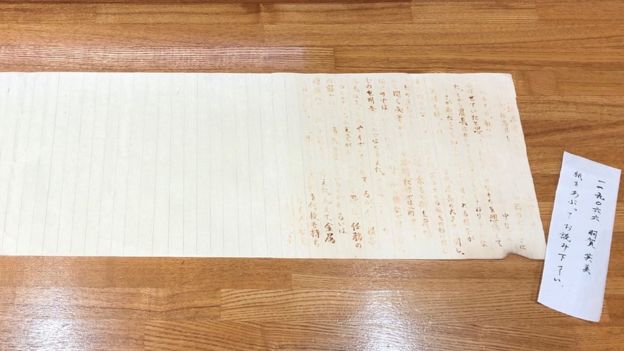A Japanese student of ninja history handed in a blank paper and still passed with flying colors. Her secret? Invisible ninja ink.

Image via BBC.
Eimi Haga, a student at the Mie University in Japan, wrote her paper using the ninja technique of “aburidashi.” Apart from the time she used to research and write her assignment, Haga also spent hours soaking and crushing soybeans to make the ink, she told the BBC. Luckily, her professor eventually heated the paper over a gas stove to reveal the text, otherwise, her grades might not have reflected her commitment to the task.
Hidden in plain sight
“It is something I learned through a book when I was little,” Ms Haga told the BBC. “I just hoped that no-one would come up with the same idea.”
Her interest in ninjas, the infamous spies and assassins of medieval Japan, first sprouted during her childhood from watching animated TV shows. For her class on ninja history, the first-year student was asked to write about a visit to the Ninja Museum of Igaryu.
“When the professor said in class that he would give a high mark for creativity, I decided that I would make my essay stand out from others,” she said.
“I gave a thought for a while, and hit upon the idea of aburidashi.”
She created the ink by soaking soybeans overnight, crushing them, and squeezing them through a cloth. She then mixed the soybean extract with water, spending two hours to get the concentration just right to create the ink. The final step was to write her essay with a fine brush on “washi” (thin Japanese paper).

Image via BBC.
After the ink dried, it became invisible. To make sure she wouldn’t be dismissed out of hand, she left a note (with normal ink) for her professor to “heat the paper”. The professor, Yuji Yamada, told the BBC he was “surprised” when he saw the essay.
“I had seen such reports written in code, but never seen one done in aburidashi,” he said. “To tell the truth, I had a little doubt that the words would come out clearly. But when I actually heated the paper over the gas stove in my house, the words appeared very clearly and I thought ‘Well done!’
He added that although he didn’t read the full paper — “I thought I should leave some part of the paper unheated, in case the media would somehow find this and take a picture” — he didn’t hesitate to give it full marks.
The art of the ninja is a tradition going back hundreds of years to Japan’s feudal era. Ninjas didn’t serve in battles directly, but they did operate akin to the special forces of today, gathering intel, taking out key individuals, and even helping to shape strategy. Techniques such as aburidashi allowed them to share information covertly and protect it from prying eyes.









